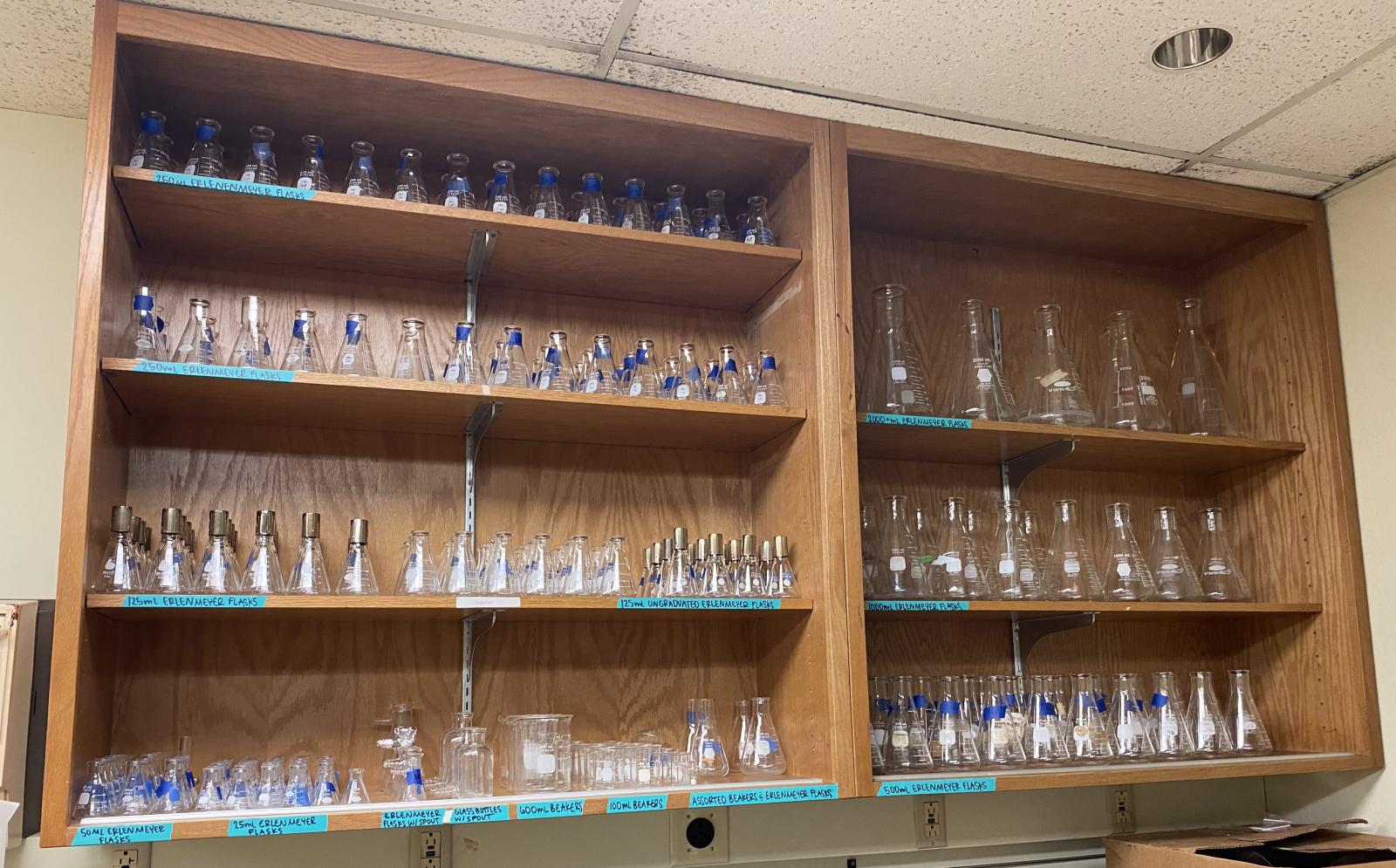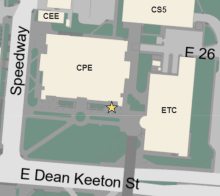Labs on campus produce a lot of waste. Think about the amount of resources (plastic, glass, paper, gloves, electronics, etc.) you use each time you run an experiment or are in the field. Thankfully, a big proportion of the waste produced in labs can be minimized through sustainable purchasing, participating in Lab Supply Swaps, utilizing Surplus Property, borrowing supplies or equipment, and other simple actions.
While recycling is great, eliminating the need for a product in the first place is better. Following the zero-waste hierarchy shown above will help us conserve our resources and leave a smaller environmental footprint.
Surplus Lab Glassware
Green Labs collects usable, unneeded lab glassware from UT Austin labs and rehomes it to other labs across campus.

Request Glassware
To request free glassware for your lab view our available inventory and fill out this request form. For specialty glassware, such as condensers, please see the specialty glassware inventory. A Green Labs team member will contact you within 3 business days to discuss delivery. The Principal Investigator (PI) of your lab will be notified of the glassware you receive.
Donate Glassware
To donate glassware to the program, complete this donation form. You will be asked to provide a description and picture of the glassware. Please ensure the glassware meets the requirements listed below. A Green Labs team member will contact you within 3 business days to discuss pick up.
Donated glassware must be:
- In usable condition
- Clean and safe to handle without gloves
- Free of any chips, scratches, or breaks (even very minor)
- Free of residue
Unwanted lab glassware must not be sent to Surplus Property. If you have lab glassware that cannot be donated and needs to be disposed of, please see guidance from EHS.
Thank you for helping minimize waste and making UT labs more sustainable!
Lab Supply Swap
Lab Supply Swaps help keep usable lab items out of the landfill and save labs money. Lab Supply Swaps give researchers a great opportunity to clear out unneeded items from their labs and take other donated items back to their lab for free, even if they are unable to donate. See a list of items we can and cannot accept below. During our Lab Supply Swaps in February 2020 and April 2022, we rehomed over 950 lbs. of lab items saving researchers approximately $37,000 in acquisition costs.
To be the first to know about our next Lab Supply Swap, click here to sign up for our email list.
Important notes:
- Items can only be used in a UT Austin lab.
- You must consult the Principal Investigator (PI) of the lab before donating any items.
- Student researchers, before picking up items for your lab, you must get permission from your PI or a senior staff member of your lab.
- Before donating, clean items with a detergent solution, 10% bleach solution, or another appropriate cleaner dependent upon the type of contamination.
- Lab members will be responsible for transporting items to and from the swap. Please bring empty boxes or a lab cart for transportation.
- If needed, Green Labs will have limited availability to help with transportation of items to a lab. Please ask a Green Labs team member for details at the swap.
- If your lab has more than 4 boxes of items to donate, please contact Green Labs as soon as possible.
- For easiest access to the Lab Supply Swap, please enter CPE from the Chemical Engineering side of the building (denoted with a star on the map below). There will be signs to direct you to CPE 3.420.

Items we accept:
- Lab consumables (e.g. gloves, glassware, plasticware, pipette tips, centrifuge tube racks, lab notebooks)
- Field equipment (e.g. field books, tape measures, sample bottles)
Items we cannot accept:
UT asset tagged/inventoried items (includes most lab equipment/instruments)- These items must be sent to Surplus Property.

- Furniture-These items must be sent to Surplus Property.
- Computers, laptops, or computer monitors-These items must be sent to Surplus Property.
- Hazardous materials (e.g. chemicals, biological materials, lasers, x-rays, radioactive materials, or equipment used with radioactive materials). For information on how to donate usable chemicals to Green Labs, check out our Surplus Chemical program.
For event updates and reminders, please click here to sign up for our general mailing list.
Contact Green Labs with any questions.
Hosted by Green Labs in partnership with Surplus Property

Sustainable Purchasing
If you have to buy a new item for your lab, practice sustainable purchasing. Sustainable purchasing considers the broader implications of the purchase of goods and services, with an aim to maximize value and minimize environmental and social costs. When considering purchasing an item, think:
- Is this item necessary?
- How was it made?
- How long will it last?
- How will it be disposed of?
Focus on reducing waste and water and energy consumption (UBC Sustainable Purchasing Guide).
Below are a few ways to practice sustainable purchasing. For further specifics and more information on how to practice sustainable purchasing, check out our Green Labs Manual . Always consult the Principal Investigator (PI) of your lab before implementing any changes.
- Chose to purchase from brands that promote sustainability whenever reasonably feasible. Brands such as ThermoFisher Scientific, Millipore Sigma, and VWR have designated “green” products to make it easier to find more sustainable items. Be sure to purchase through UT Market to receive university pricing.
- Purchase energy- (i.e. ENERGY STAR) and water-efficient equipment when possible.
- Use the ACT Environmental Impact Factor Label database to compare the environmental impact factor of hundreds of lab consumables, equipment, and chemicals.
- Check out this Green lab supplies and equipment guide from LabConscious for products that help conserve energy and water, reduce waste, and use less hazardous chemicals.
Contact Green Labs
Green Labs
greenlabs@austin.utexas.edu
Lindsey Yazbek
Green Labs Coordinator
lindsey.yazbek@austin.utexas.edu
Click here to sign up for our Green Labs email list.
